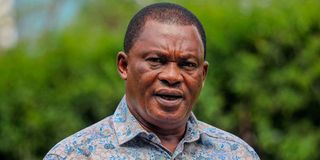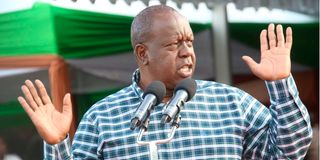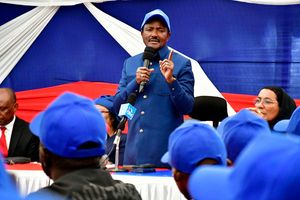
Former Deputy President Rigathi Gachagua (front, second left) with other opposition leaders when they met in Nairobi.
President William Ruto and the opposition are on a collision course over human rights violations and State capture, amid a surge in extrajudicial killings, abductions and police brutality.
Opposition leaders recently launched the People’s Restorative Justice Commission to address State-sponsored injustices and restore dignity to victims of violence, abductions and systemic impunity.
Unveiled at Ufungamano House, the commission is chaired by former Attorney-General Justin Muturi. Its members include Makueni Senator Daniel Maanzo, People's Liberation Party Secretary-General Asha Bashir and academic and activist Prof. Fred Ogola. It is tasked with gathering evidence on behalf of the voiceless and ensuring justice for victims of abductions and enforced disappearances.

Former CS Justin Muturi.
In the coming weeks, the commission is expected to begin public hearings and collect testimonies. It will also explore options for private prosecutions, memorialisation, reparations and public truth-telling, all outside the control of State institutions.
Wiper party leader Kalonzo Musyoka said the commission will push for compensation for victims of recent protests. It will also examine broader issues, including the controversial housing tax, the new university funding model and other forms of State overreach.
“We have a lot to address in this country but adequate compensation for victims of protests is more important than anything else. If I were President Ruto, I would expand this commission to a national level because if we do not act now, we risk losing the nation altogether,” Mr Musyoka said.
According to a report by the State-funded Kenya National Commission on Human Rights, at least 19 people were killed during last Wednesday’s protests, with more than 400 injured. There were also 15 enforced disappearances,179 arrests, and cases of sexual violence.
In 2024 alone, at least 60 young Kenyans were killed in anti-tax protests. Several more died or disappeared during demonstrations this year.
Unlike commissions established by the Executive or Parliament, the commission is the first tribunal in Kenya’s history to be initiated by the people.
It draws its mandate not from presidential decree, but from public demand, particularly following the brutal crackdown on the anti-Finance Bill protests in June 2024, during which dozens of young Kenyans were killed or forcibly disappeared.
Mr Muturi said that where sufficient evidence exists, the commission will recommend and pursue prosecutions.
“We do not need the DPP’s permission to initiate private prosecutions,” he stated.
Ms Bashir added: “In this country, we have lived with massacres, police brutality and corruption—and we keep running from the past. Kenyans are crying every day because of injustice.”

Former Interior Cabinet Secretary Fred Matiang'i addresses a meeting at former Deputy President Rigathi Gachagua residence in Wamunyoro on May 4,2025.
Former Interior Cabinet Secretary Fred Matiang’i called for a public inquest into extrajudicial killings, including those that occurred during his own tenure at the ministry.
Over the past three decades, Kenya has seen numerous justice commissions, which submitted reports that now gather dust in government offices with none leading to meaningful prosecutions or systemic change.







